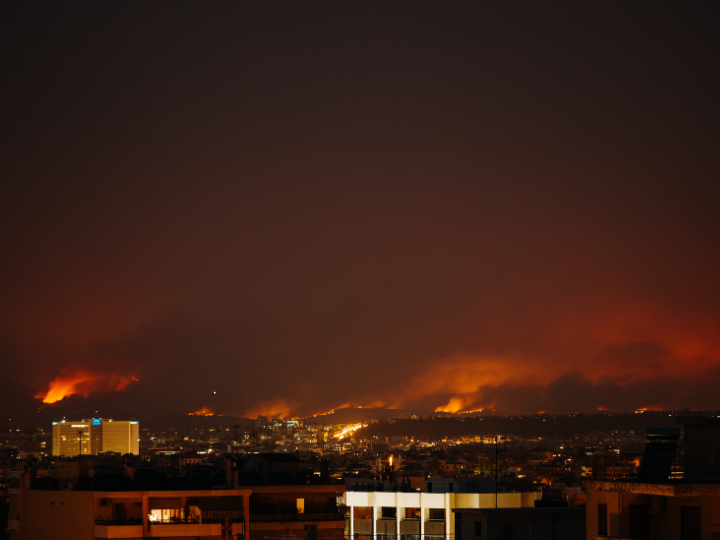by Kira Taylor
Europe is on fire again, and pictures from this year’s wildfires in Greece, Spain, and Italy look more like scenes from a dystopian film than real life, but this is likely just the start.
While wildfires are common in the Mediterranean, but the climate crisis is increasing their intensity and frequency, meaning larger, hotter fires more often.
Globally, 2023 has seen wildfires, heatwaves, and floods of almost biblical proportions. Meanwhile, ocean temperatures are increasing, with average surface temperatures reaching unprecedented levels for June and sea ice failing to regrow in the Antarctic.
If this were a movie, you’d expect top-secret government meetings, panicked news reports, and a group of desperate scientists working with every available resource to resolve it.
Yet, the real word version is disturbingly apathetic. Even when the panic sets in, it is often fleeting. Embraced by fires, heatwaves, and floods, the world is literally becoming the ‘this is fine’ meme.
This is terrifying to my generation, who will live to see whether the world reaches its net zero goals, possibly even to see what warming happens at the end of the century and its effects. Whatever choices are made now will dictate the course of our lives.
And it is not like we didn’t have any warning.
Already in the late 1800s, there was an inkling that burning fossil fuels would lead to a build-up of carbon dioxide and insulate the Earth. In the 1970s, scientists at fossil energy giant Exxon predicted global warming and for decades, scientists have warned about the drastic and irreversible consequences of the status quo continuing.
Sadly, many of the poorest nations have borne the brunt of climate disasters. Africa has seen catastrophic famines, heatwaves and pandemics (the last often triggered by biodiversity loss), islands, like those in the Pacific, are being lost to rising sea levels, and Southeast Asia has seen devastating heatwaves and floods.
It seems a very colonial mentality to only panic about the climate crisis when it hits close to home, especially given the Global North’s responsibility for the amount of carbon in the atmosphere.
But better late than never to speed up the major systemic change required to decarbonise energy and industry, cut down on consumption, adapt to extreme weather and more.
This also makes economic sense in the long run.
In Europe alone, the European Commission hopes the transition will attract at least €1 trillion of investments by 2030, while the cost of inaction could shave 11% off southeast Asia’s GDP by 2100. And the longer the world waits, the more costly tackling the issue will be.
Still, this seems beyond our reach. Time and again, short-term economic gains have been prioritised over the long-term stability of nations, energy, food and water security, the avoidance of wars, and the unnecessary creation of refugees.
Take the example of the biggest oil and gas companies quietly rolling back pledges, including Shell dropping plans to cut oil production up to 2030 and BP cutting its emissions pledge.
There is also a disturbing apathy in governments and public opinion. Look at the pushback against green laws in Europe or the Daily Mail attacking a climate journalist rather than the broader issues driving the crisis.
The world already has the Paris Agreement, which despite labour pains, looks easy compared to the actual work needed to reach the goal of limiting global warming to 1.5°C above pre-industrial levels.
But shying away or turning our backs is not an option if we want a liveable future.
If we want to avoid migrants dying in the Mediterranean, ensure food and water security and have enough liveable areas for a growing population, a major part of the solution is avoiding the catastrophic failure of the ecosystems.
The world needs a major systemic change, including every country and every nation, and every day we wait, we make the challenge bigger.
*first published in: Euractiv.com




 By: N. Peter Kramer
By: N. Peter Kramer
